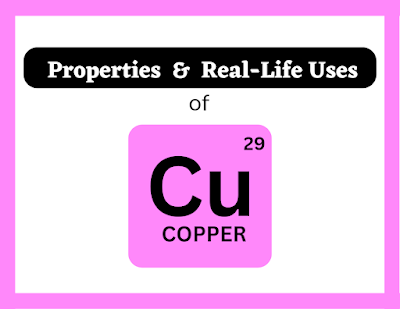Properties and Real Life Uses of Copper
Copper is a chemical element with the symbol Cu and atomic number 29. It is a soft, malleable, and ductile metal that belongs to the transition metals group in periodic table. Copper is one of the most widely used metals in the world. It has a wide range of applications in various industries due to its unique properties, including its excellent thermal and electrical conductivity.
Physical and Chemical Properties of Copper
Chemical Symbol: Cu
Atomic Number: 29
Atomic Mass: 63.55 u
Electron Configuration: [Ar] 3d10 4s1
Melting Point: 1,085°C
Boiling Point: 2,562°C
Density: 8.96 g/cm³
Copper has a melting point of 1083°C and a boiling point of 2567°C. It is a soft, malleable, and ductile metal with a density of 8.96 grams per cubic centimeter. Copper is highly resistant to corrosion and oxidation, making it an ideal material for use in harsh environments. It is also an excellent conductor of heat and electricity, with a thermal conductivity of 401 W/mK and an electrical conductivity of 59.6 MS/m.
Real life Uses of Copper
Copper has a wide range of applications in various industries including... construction, electronics, transportation. Here are some of the most common uses of copper:
Electrical Wiring: Copper is used extensively in electrical wiring due to its excellent electrical conductivity. Copper wiring is used in various applications including power generation, transmission and distribution.
Plumbing: Copper is widely used in plumbing due to its excellent corrosion resistance and thermal conductivity. Copper pipes and fittings are used in various applications including... potable water supply, heating, and cooling systems.
Architecture: Copper is used in architectural applications including roofing, gutters, flashing. Copper roofing is highly durable and resistant to weathering, making it ideal for use in harsh environments.
Electronics: Copper is used extensively in electronics, including printed circuit boards and electrical contacts. Copper is an excellent conductor of electricity and is also highly resistant to corrosion and oxidation.
Coinage: Copper is used in the production of coins, including the US penny. Copper is an ideal material for coinage due to its excellent durability and resistance to wear.
Transportation: Copper is used in various transportation applications including automobile radiators, brake lines, and fuel lines. Copper alloys are also used in marine applications due to their excellent resistance to corrosion.
In conclusion, Copper is an essential element with a wide range of applications in various industries. Its unique properties including... its excellent thermal and electrical conductivity, make it an ideal material for use in various applications. From electrical wiring and plumbing to architecture and transportation, Copper plays a vital role in our daily lives.




0 Comments